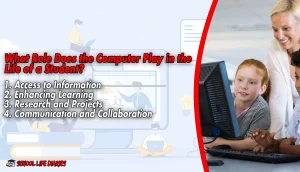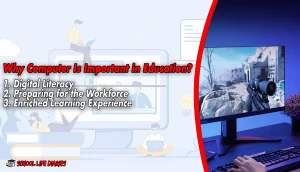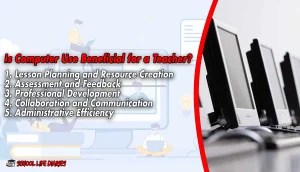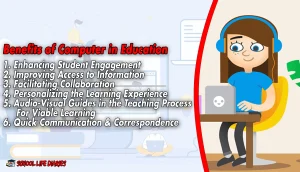In today’s rapidly evolving world, technology has become an integral part of various aspects of our lives, including education. The Use of computers in Education has revolutionized the way students learn and teachers teach. Computers offer numerous benefits that enhance the learning experience and equip students with essential skills for the future.
This article explores the significance of computer education, the role of computers in students’ lives, the importance of computers in education, and the benefits they bring to both students and teachers.
What is Computer Education?
Computer education refers to the process of imparting knowledge and skills related to computers and their applications in various domains. It involves teaching students about computer hardware, software, programming, and other relevant concepts. Computer education equips students with the ability to use computers effectively, solve problems, and navigate the digital landscape confidently.
What Role Does the Computer Play in the Life of a Student?
Computers play a crucial role in the life of a student. They have become an essential tool for learning, research, and communication. Here are some key roles computers fulfill in students’ lives:
1. Access to Information:
Computers provide students with access to a vast amount of information through the Internet. With a few clicks, students can explore a wide range of educational resources, articles, e-books, videos, and scholarly journals.
2. Enhancing Learning:
Computers facilitate interactive learning experiences through multimedia tools, simulations, and educational software. They offer engaging and immersive ways to comprehend complex subjects, making learning more enjoyable and effective.
3. Research and Projects:
Students can conduct in-depth research and work on projects using computers. They can gather information, analyze data, create presentations, and collaborate with classmates seamlessly.
4. Communication and Collaboration:
Computers enable students to communicate with peers, teachers, and experts from around the world. They can participate in online forums, join virtual classrooms, and engage in collaborative projects, fostering global connections and diverse perspectives.
Why Computer Is Important in Education?
Computers are important in education for various reasons. Here are some key factors highlighting their significance:
1. Digital Literacy:
In the digital age, being proficient with computers is essential. Computer education equips students with the necessary skills to navigate digital platforms, use productivity tools, and adapt to future technological advancements.
2. Preparing for the Workforce:
Most professions require computer skills. By integrating computer education into the curriculum, educational institutions prepare students for future careers that heavily rely on technology. Students proficient in computers have a competitive edge in the job market.
3. Enriched Learning Experience:
Computers offer interactive and personalized learning experiences. They cater to different learning styles and adapt to individual progress.
Is Computer Use Beneficial for a Teacher?
Absolutely! Computers offer numerous benefits to teachers, enhancing their teaching methodologies and administrative tasks. Here’s why computer use is beneficial for teachers:
1. Lesson Planning and Resource Creation:
Computers provide teachers with tools to create engaging lesson plans, design multimedia presentations, and develop interactive resources. They can access a wide range of educational materials and tailor them to meet students’ needs.
2. Assessment and Feedback:
Computers facilitate the creation and grading of assessments, enabling teachers to provide timely feedback. Online assessment tools and automated grading systems save time, allowing teachers to focus on providing personalized guidance.
3. Professional Development:
Computers offer opportunities for teachers to enhance their professional development. Online courses, webinars, and educational platforms provide access to a wealth of resources, enabling teachers to stay updated with the latest pedagogical practices.
4. Collaboration and Communication:
Computers enable teachers to collaborate with colleagues, share resources, and seek advice from experts. Online platforms and forums provide spaces for teachers to engage in professional discussions, fostering a supportive community.
5. Administrative Efficiency:
Computers streamline administrative tasks for teachers, such as attendance management, grade calculations, and report generation. By automating these processes, teachers have more time to focus on instruction and student support.
Benefits of Computer in Education
Computers bring numerous benefits to education. Here are five key advantages:
1. Enhancing Student Engagement:
Computers provide interactive and engaging learning experiences, capturing students’ attention and encouraging active participation. Multimedia elements, educational games, and simulations make learning enjoyable and promote critical thinking.
2. Improving Access to Information:
Computers connected to the internet offer limitless access to information. Students can explore a wide range of educational resources, conduct research, and access up-to-date information from anywhere, anytime.
3. Facilitating Collaboration:
Computers enable students to collaborate on projects, both within the classroom and with peers around the world. Online platforms, shared documents, and video conferencing tools promote teamwork and the exchange of ideas.
4. Personalizing the Learning Experience:
Computers adapt to individual learning styles and paces. Personalized learning software and intelligent tutoring systems provide tailored instruction, allowing students to learn at their own pace and focus on areas that need improvement.
5. Audio-Visual Guides in the Teaching Process For Viable Learning:
Computers facilitate the use of audio-visual aids, such as videos, animations, and presentations, to explain complex concepts effectively. Visual representations enhance understanding and retention of information.
6. Quick Communication & Correspondence:
Computers enable swift communication between students, teachers, and parents. Email, online messaging, and video conferencing tools allow seamless communication, ensuring timely feedback and support.
Conclusion:
The use of computers in education has revolutionized the learning experience for students and teachers alike. Computers enhance student engagement, improve access to information, facilitate collaboration, personalize the learning experience, and enable quick communication.
They play a vital role in equipping students with the necessary digital literacy skills for the future and preparing them for the workforce. Moreover, computers offer teachers various tools for lesson planning, assessment, professional development, and administrative efficiency. Embracing computer education unlocks countless opportunities for both students and teachers, empowering them to thrive in an increasingly digital world.








